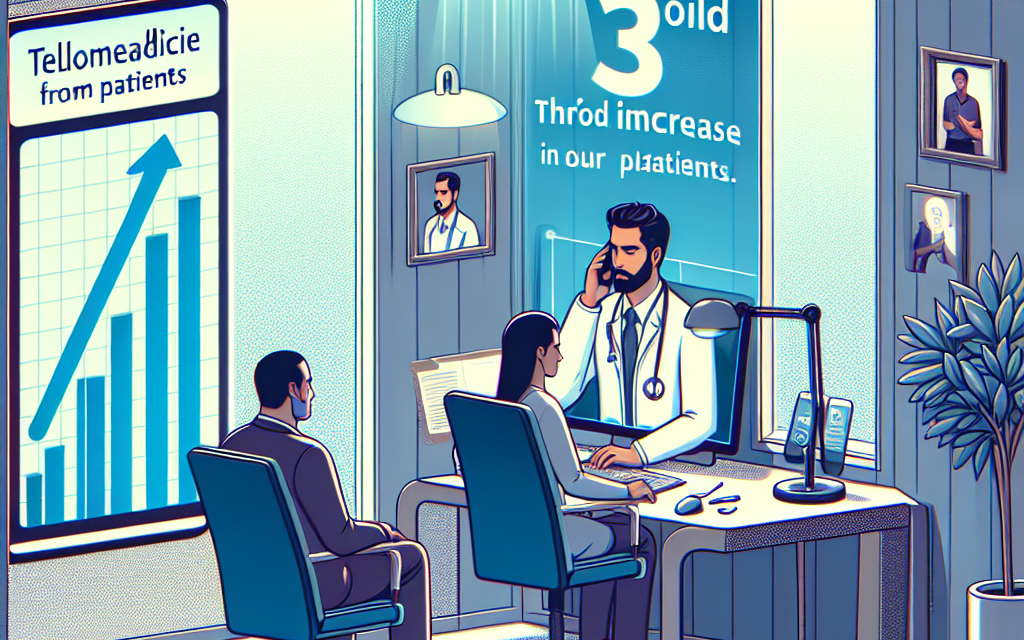Telemedicine Boosts SSM Health’s Psychiatric Care Volume Threefold
In recent years, the healthcare landscape has undergone a significant transformation, particularly in the realm of mental health services. Telemedicine has emerged as a powerful tool, enabling healthcare providers to reach patients in ways that were previously unimaginable. One notable example of this shift is SSM Health, a healthcare organization that has successfully tripled its psychiatric care volume through the implementation of telemedicine. This article delves into the various aspects of this transformation, exploring the benefits, challenges, and future implications of telepsychiatry.
The Rise of Telemedicine in Mental Health Care
Telemedicine, defined as the remote diagnosis and treatment of patients through telecommunications technology, has gained traction in various medical fields. However, its impact on mental health care has been particularly profound. The COVID-19 pandemic accelerated the adoption of telehealth services, as social distancing measures made in-person visits challenging. According to a report by McKinsey & Company, telehealth utilization in the U.S. surged from 11% of consumers in 2019 to 46% in 2020.
SSM Health recognized the potential of telemedicine early on and began integrating it into their psychiatric services. The organization aimed to address the growing demand for mental health care, which has been exacerbated by the pandemic. The National Institute of Mental Health (NIMH) reported that the prevalence of anxiety and depression increased significantly during this period, highlighting the urgent need for accessible mental health services.
By leveraging telemedicine, SSM Health was able to provide timely care to patients who might otherwise have faced barriers to accessing mental health services. This included individuals living in rural areas, those with mobility issues, and those who were hesitant to seek in-person care due to stigma or fear of exposure to COVID-19.
Enhancing Access to Care
One of the most significant advantages of telemedicine is its ability to enhance access to care. For many patients, especially those in underserved areas, traditional psychiatric services can be difficult to access. Long wait times, transportation issues, and a shortage of mental health professionals contribute to this challenge.
SSM Health’s telepsychiatry program has effectively addressed these barriers by offering virtual appointments that patients can attend from the comfort of their homes. This has led to a substantial increase in the number of patients receiving care. According to SSM Health’s internal data, the organization reported a threefold increase in psychiatric care volume within a year of implementing telemedicine services.
- Rural Populations: Many rural areas lack sufficient mental health resources. Telemedicine allows SSM Health to reach patients in these regions, providing them with access to specialized care that may not be available locally.
- Convenience: Patients can schedule appointments at times that work for them, reducing the need for time-consuming travel and allowing for greater flexibility in managing their mental health.
- Reduced Stigma: For some individuals, the stigma associated with seeking mental health care can be a significant barrier. Telemedicine offers a level of anonymity that can encourage more people to seek help.
Furthermore, SSM Health has implemented user-friendly technology to facilitate virtual visits. Patients can easily connect with their providers through secure video conferencing platforms, ensuring that their privacy and confidentiality are maintained. This ease of use has contributed to higher patient satisfaction rates and increased engagement in treatment.
Improving Patient Outcomes
Telemedicine not only enhances access to care but also has the potential to improve patient outcomes. Research has shown that telepsychiatry can be as effective as in-person visits for various mental health conditions, including depression, anxiety, and post-traumatic stress disorder (PTSD).
SSM Health’s telepsychiatry program has incorporated evidence-based practices to ensure that patients receive high-quality care. Providers utilize standardized assessment tools to evaluate patients’ mental health status and tailor treatment plans accordingly. This data-driven approach allows for more personalized care, which can lead to better outcomes.
- Continuity of Care: Telemedicine facilitates ongoing communication between patients and providers, allowing for regular check-ins and adjustments to treatment plans as needed.
- Increased Engagement: The convenience of virtual appointments encourages patients to attend sessions more regularly, which is crucial for effective treatment.
- Access to Specialists: Telemedicine enables patients to connect with specialists who may not be available in their local area, ensuring they receive the best possible care.
Moreover, SSM Health has implemented follow-up protocols to monitor patients’ progress and address any concerns that may arise during treatment. This proactive approach has resulted in improved patient satisfaction and a greater likelihood of successful treatment outcomes.
Challenges and Limitations of Telepsychiatry
While the benefits of telemedicine in psychiatric care are significant, there are also challenges and limitations that must be addressed. SSM Health has encountered several obstacles in its telepsychiatry program, which are important to consider as the organization continues to expand its services.
- Technology Barriers: Not all patients have access to the necessary technology or reliable internet connections to participate in virtual appointments. This digital divide can exacerbate existing disparities in mental health care access.
- Licensing and Regulations: Telemedicine regulations vary by state, and providers must navigate complex licensing requirements to offer services across state lines. This can limit the availability of care for patients in certain regions.
- Clinical Limitations: Some patients may require in-person assessments or interventions that cannot be effectively delivered through telemedicine. This is particularly true for individuals with severe mental health conditions who may need more intensive support.
SSM Health has taken steps to mitigate these challenges by offering resources and support to patients who may struggle with technology. This includes providing training on how to use telehealth platforms and offering alternative options for those who cannot access virtual care. Additionally, the organization is actively engaged in advocacy efforts to streamline telemedicine regulations and improve access to care for all patients.
The Future of Telepsychiatry
The success of SSM Health’s telepsychiatry program has paved the way for future innovations in mental health care. As the demand for psychiatric services continues to grow, telemedicine is likely to play an increasingly important role in meeting this need.
Looking ahead, several trends are emerging in the field of telepsychiatry:
- Integration with Primary Care: There is a growing recognition of the importance of integrating mental health care with primary care services. Telepsychiatry can facilitate this integration by allowing primary care providers to collaborate with mental health specialists in real-time.
- Use of Artificial Intelligence: AI technology is being explored as a tool to enhance telepsychiatry services. For example, AI algorithms can analyze patient data to identify trends and predict potential mental health crises, enabling providers to intervene proactively.
- Expansion of Services: As telemedicine continues to evolve, SSM Health plans to expand its telepsychiatry offerings to include group therapy sessions, psychoeducation, and support groups, further enhancing the range of services available to patients.
In conclusion, SSM Health’s experience with telemedicine has demonstrated its potential to revolutionize psychiatric care. By tripling their care volume through telepsychiatry, the organization has not only improved access to mental health services but also enhanced patient outcomes and satisfaction. While challenges remain, the future of telepsychiatry looks promising, with ongoing innovations poised to further transform the landscape of mental health care.
Conclusion
Telemedicine has emerged as a game-changer in the field of psychiatric care, as evidenced by SSM Health’s remarkable success in tripling its care volume. The ability to enhance access to care, improve patient outcomes, and address the challenges of traditional mental health services has positioned telepsychiatry as a vital component of modern healthcare. As we look to the future, it is clear that telemedicine will continue to play a crucial role in shaping the way mental health services are delivered, ensuring that individuals receive the support they need in a timely and effective manner.





